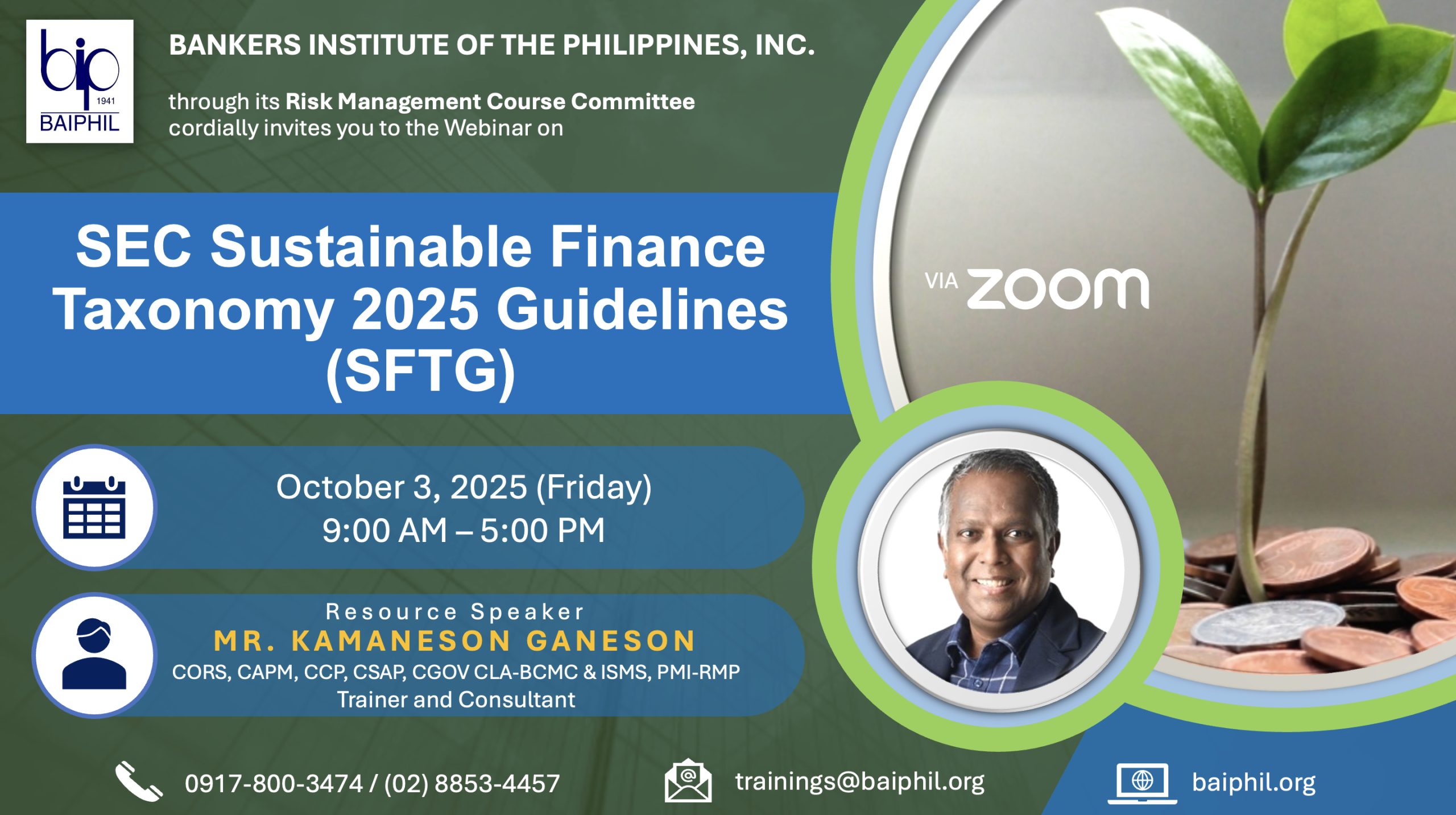Description
Program Overview
The Philippine Sustainable Finance Taxonomy Guidelines (SFTG) was formulated through collaborative efforts between the Bangko Sentral ng Pilipinas (BSP), the Securities and Exchange Commission (SEC), and the Insurance Commission (IC). This initiative was carried out under the auspices of the Financial Sector Forum (FSF) in line with the directives outlined in the Philippine Sustainable Finance Roadmap, which was issued by the Inter-agency Technical Working Group for Sustainable Finance (also known as the Green Force) in October 2021.
The primary goal of the SFTG is to channel and amplify capital towards economic endeavours that further sustainability goals, such as lowering greenhouse gas (GHG) emissions and bolstering climate resilience. Additionally, it fosters transparency and reliability by reducing the likelihood of greenwashing and facilitates a fair transition to a sustainable economy.
The SFTG provides a set of guiding questions and decision trees to support the regulated entities’ assessment. In addition, entities undertaking the economic activity should comply, at a minimum, with the Philippine social safeguard requirements. After the assessment process, economic activities may be classified as Green, Amber or Red, following the definitions under the SFTG. An activity that falls under the Red classification does not imply that the activity is unsustainable. Rather, the subject activity does not meet the higher sustainability ambition of the SFTG or pass the DNSH or minimum social safeguards tests. The activity classified as Red may still be eligible for “unlabelled” financing.
The SFTG offers a simplified approach for the assessment of micro, small and medium enterprises’ (MSMEs) activity for financing. This is to ensure that MSMEs are not unduly excluded from participating in sustainable finance.
In this session, we will provide all the necessary guidance and interpretation of the SFTG 3 pillars of assessment, mainly the Do, No, Significant, Harm (DNSH), Remedial Measures to Transition (RMT), and Minimum Social Safeguards (MSS).
Learning Objectives
At the end of the training, participants are expected to:
- To understand the SFTG Guidelines and its requirements
- To Effectively use the Decision Tree Analysis to establish the DNSH, RMT and MSS key points for the organization to undertake its ESG or Sustainability program scope
- To understand the alignment of the Organization to the Philippines Development Plan on the Philippine’s commitment to the 2015 Paris Accord in terms of its CO2 footprint reduction
Duration
1 day (8-hour session)
Target Audience
- Governance and Leadership (Top Management)
- CSR Management Steering Committee
- ESG Practitioners and Managers
- Chief Sustainability Officers / Teams / Committee Members
- Compliance Officers
- Audit Teams
- Risk Management Practitioners
Program Structure and Outline
The Program is delivered using a combination of instructor-led lectures, case studies, and exercises on the practical implementation of the concepts discussed within the training. The topics presented below define the areas of focus under the program.
- Executive Summary
- Glossary of Terms
- The Philippine Context for Sustainable Finance
- The Sustainable Finance Taxonomy Guideline
- Assessment of Activities under the SFTG
- Appendix 1: Non-Exhaustive Laws for Minimum Social Safeguards
- Appendix 2: Compilation of Guiding Questions for EOs and Essential Criteria
- Appendix 3: Use Case on Climate Change Mitigation
- Appendix 4: Use Case on Climate Change Adaption
- Appendix 5: Examples of Industry Standards & Certifications and Verifications
- Appendix 6: Non-Exhaustive list of potentially eligible projects or activities for MSMEs
Resource Speaker:
MR. KAMA NESON GANESON
CORS, CCP, CSAP, PMP, PMI-RM, CLA ISMS & BCMS, ERMP
Course Director and Master Trainer
Schedule:
October 3, 2025 (Friday) 9:00 AM – 5:00 PM
Training Fee per Participant:
Member Institution – Php3,920.00
Non-Member Institution – Php5,040.00
*VAT inclusive

